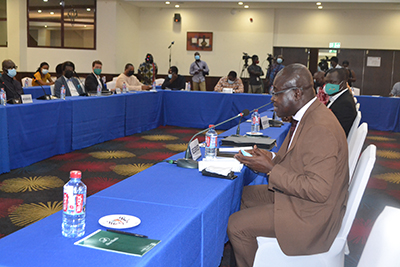
Participants in a forum on the African Continental Free Trade Agreement (AfCFTA) have recommended investment in Ghana’s standardisation infrastructure to support businesses to take advantage of the Agreement.
They argued that without a stringent standardisation infrastructure, Ghana stood the risk of having its export produce rejected by member countries and becoming a dumping ground for inferior goods from other states.
The participants included Professor Alex Dodoo, Director General of the Ghana Standards Authority; John Awuah, Chief Executive (CEO) of the Ghana Association of Bankers; Seth Twum Akwaboah, CEO of Association of Ghana Industries; ,Joseph Obeng, President of the Ghana Union of Traders Association (GUTA); and Nlaliban Wujangi, CEO of Agriculture and More (Agmore) Limited.
Organised by policy think tank, Imani Ghana, with the support of the German International Corporation (GIZ), the event was on the theme ‘What does the AfCFTA mean for Ghanaian businesses?’
Prof. Dodoo explained that Ghana could only benefit from international trade through the institution of best standardisation procedures.
He said effective standardisation would ensure that Ghana’s export meet international requirements and thereby enhance demand for Ghanaian products on the world market.
He stressed the need for an accessible and affordable standards regime to ensure small businesses were not disadvantaged in the standardisation stage.
The GSA, Prof Dodoo said, had focused its operations on enforcement of Ghana’s standards, simplification of standards and testing of product to check for compliance with standards.
Echoing similar views, Mr Awuah said financial institutions were opened to providing support to businesses if the standards regime was effective and enforced.
He said effective standardisation would instill confidence in investors and reduce the risk of losses.
The AGI, Mr Akwaboah said, was looking forward to the development of Ghana’s AfCFTA strategy, which would inform the private sector of key areas and priorities that positioned the country well to take advantage of the agreement.
“A country strategy allows those of us in the private sector to know the direction of government and we’re advised on our own initiatives.
The AfCFTA is big for us and we must do all we can to maximise our gains. We are ready to work with the government in developing this much-needed strategy,” he added.
The National President of GUTA said traders required more information regarding Ghana’s standardisation to be able to compete in the market created by the AfCFTA.
Mr Obeng noted that traders were ready to comply with guidelines associated with the Agreement and urged the government to ensure an enabling environment for production and addressing impediments to small business growth.
For Ghana to compete favourably on the new African markets, Mr Wujangi urged Ghana to focus on areas including agriculture where it had competitive advantage over most of the countries in the region.
“We should develop these areas through efficient production systems and value addition. We produce more tubers, cereals and grains which we can maximise our gains on. We cannot allow the AfCFTA to become a threat to us,” he said.
BY CLAUDE NYARKO ADAMS







